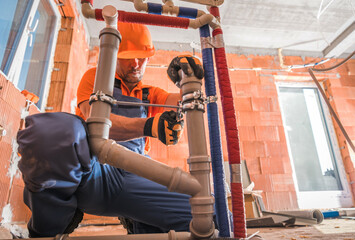How to Become a Plumber
Plumbing is one of the most varied professions, and it requires a diverse set of skills. Plumbers must be skilled in reading blueprints and interpreting them and have a comprehensive knowledge of local codes. In addition to working with various tools, plumbers also need to communicate effectively with other professionals, including Electricians. A plumber’s work often requires them to perform various repairs, including fitting pipes and soldering copper pipes.

Performing these tasks is a challenge that requires a wide range of skills, including problem-solving skills, the ability to weigh multiple solutions, and the ability to lift heavy tools and equipment. However, the outlook for plumbers is generally good, with Labor Statistics projecting a 15% job growth over the next decade. Plumbing is one of the fastest-growing jobs in some states, so the demand for plumbers will continue to grow. Of course, the future growth of the job will depend on the economy’s health.
There are many training programs available for prospective plumbers. You can pursue an apprenticeship or attend a vocational education or certification program. Some employers prefer candidates with work experience in the plumbing industry. Fortunately, you can gain valuable hands-on experience by completing internships or apprenticeships. Once you’ve completed this training, you must apply for a state license. You’ll need to pass the required tests and meet minimum education requirements, which vary from state to state.
Plumbing jobs vary from residential to commercial. Residential plumbers deal with smaller pipes, while commercial plumbers deal with larger and more complex ones. All plumbers must meet local, state, and federal code requirements. But for those with a passion for plumbing and love, it’s important to find a plumber who’s experienced in both types of plumbing. The right plumber can ensure that your home’s plumbing systems are functioning efficiently.
Apprenticeships in plumbing are a great way to gain experience while learning on the job. Some unions have 4-year programs, while nonunion plumbers must complete at least one year of training. In either case, apprentices learn on-the-job training, regulations, and procedures and are able to install pipe systems safely. In addition, many plumbers earn their credentials through certifications, which prove their technical knowledge. In general, plumbing certifications are worth the investment.
Commercial plumbing involves large-scale waste removal and the installation of pipelines. It is also risky and requires more work and experience. Therefore, it’s best to hire a plumber specializing in the type of plumbing you need. This way, you’ll be able to avoid dealing with a subpar plumber. Similarly, residential plumbers should not hire commercial plumbers unless they have experience in large-scale settings. This will ensure the safety of your home and prevent costly repairs later.
In the past, plumbers worked for President, who used plumbers to protect sensitive information. They gathered information on political rivals and prevented leaks from the White House. During the Watergate scandal, the plumbers were suspected of numerous illegal activities. These activities included protecting the Committee for the Re-Election of the President and discrediting the Pentagon Papers. Time magazine ranked plumbers’ activities as one of the top 10 worst waves of abuse of power.
Before becoming a plumber, you must complete the necessary training. Depending on the area in which you live, you will need a minimum of two years of experience. To work as a plumber, you must pass an examination, which differs by state. Once you have passed this examination, you’ll be able to perform a wide range of tasks, from simple repair jobs to high-risk installations. However, remember that you’ll need to follow safety rules and regulations when dealing with human waste.
Plumbing contractors specialize in various tasks, allowing them to specialize in their chosen area. While many plumbers perform basic plumbing, some specialize in more complex plumbing tasks. Some plumbers specialize in new construction, remodeling, and septic systems. They may work for a larger plumbing company or a smaller plumbing company. But remember that plumbers may lack the advanced knowledge, experience, or licensing necessary to handle more complex plumbing projects.
Apprenticeships are the most common way to become a plumber. Apprenticeship programs are sponsored by trade unions, contractors, and local unions. An apprenticeship typically takes four to five years and involves 2,000 hours of on-the-job training. You’ll learn about local codes, blueprint reading, and safety during this time. In most states, you must obtain a license to work as a plumber before you can work independently.

